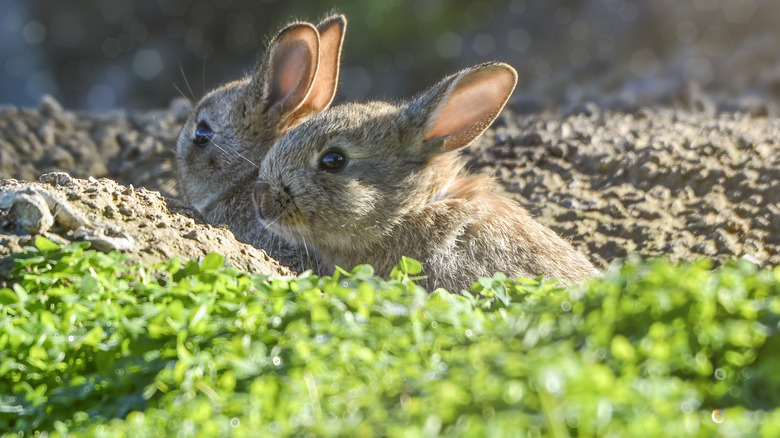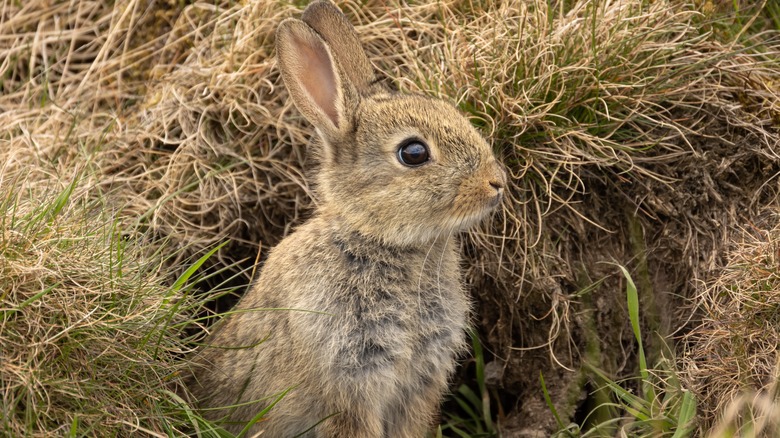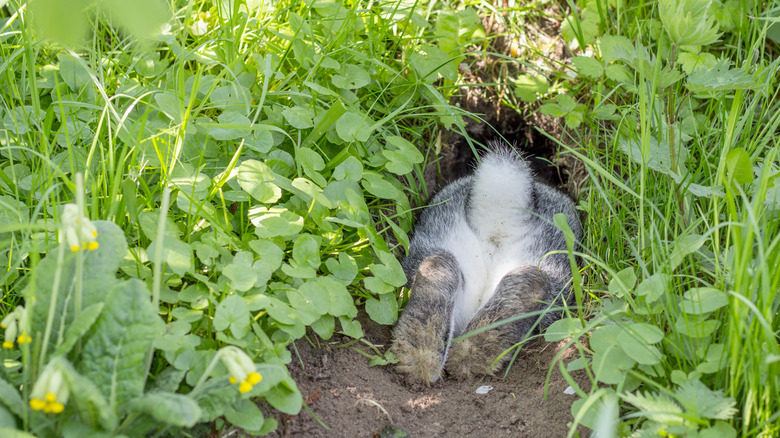Why Bunnies Are Leaving Small Holes All Over Your Lawn (And Tips To Prevent Them)
Fuzzy bunnies are frequent yard guests in many parts of the country. These little hoppers delight with ear twitches, face scratches, and general goofiness. But the one thing that isn't amusing about them is the holes they often leave behind as they make themselves at home. Bunnies, along with their powerful jumping feet, are very accomplished diggers. Digging is an important part of their survival instincts, so when bunnies are around, there are frequently one or several holes nearby. That's because bunnies live in burrows! These holes in the ground are their home sweet home. Their instinct to dig provides them with shelter against predators like owls and foxes.
The problem for homeowners is the ankle-breaking holes left in their wake. When it comes to keeping your lawn in one piece, there isn't a lot you can do to stop rabbits from digging. What you can do, however, is prevent digging in certain areas. Keep in mind that while their burrows may be a little annoying, it might not be a terrible thing to have rabbits in your lawn. Their habit of digging holes and grazing plants can make suitable homes for other species and increase biodiversity. So, it might be wise to let rabbits move into the yard, or at least certain parts of it.
Where rabbit burrows can be found in your lawn
Bunny burrows protect grown-up rabbits, but they are also crucial for the survival of little fluffball babies. Without the safety of the mama-made nest, babies would be easy targets. You may notice dead grass patches in your yard when spring rolls around. That isn't just winter ravaging your grass; those little mounds may be bunny nests with kittens (the term for baby rabbits) inside! Outside of actually seeing the babies in the nest, you can tell if it's a burrow for babies based on the materials. Mama bunnies will put their own fur and grass in there to make it more comfy for their little ones. You're less likely to trip over these types of holes in your yard, though you should be careful when starting your lawn maintenance. It can be easy to accidentally run over these nests with a mower and endanger or potentially kill the bunnies inside.
One way to encourage nesting away from the more frequented parts of your lawn is to grow a section specifically for the bunnies to nest in. For one, rabbits really like nesting near fence rows because they provide more protection than an open area of yard. You could allow weeds or grasses to overgrow near part of your fence to encourage rabbits to nest there. To further entice bunnies, you could also grow things like white clover and crabgrass in that section since they are tasty snacks for a wild rabbit.
Other methods to prevent rabbit burrows
Not everyone wants bunny rabbits moving in rent-free to their backyard. When that's the case, you can take many steps to prevent burrows in the grass. The most important thing you can do is keep your lawn clean. Rabbits love overgrown, patchy lawns because they provide a lot of burrow cover to protect them. Keeping grass, weeds, and other plants short and tidy makes the yard less appealing to the pointy-eared dwellers. For gardeners, there are a handful of plants that you can use to keep bunnies at bay. These anti-bunny plants are considered stinky to rabbits, and they are less likely to show up if these plants are around. These garden items include rhubarb and garlic. You can also throw this common vegetable around your yard to help keep rabbits away.
Rabbits also dislike the smell of Irish Spring soap, vinegar, and cayenne pepper. You can even sprinkle this fan-favorite pantry item around your garden to keep rabbits out. Dog owners are also equipped with an easy-to-use natural bunny repellent. Bunnies are known for their heightened sense of smell, making a dog yard risky. You can take some of your dog's fur and put it around the perimeter of your yard. You could even do this whenever you brush them to keep the scent lingering. Bunnies will get one whiff of that dog fur and likely find another less dangerous spot to move in.



